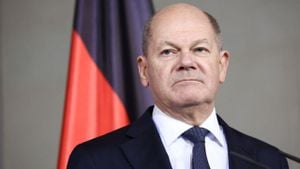The Japanese television drama series "御上先生" (Gojo-sensei), airing on TBS, has stirred significant conversations with its powerful narrative and bold themes. The show, which centers around the educator御上孝 (played by 桃李松坂), challenges the prevailing paradigms of the Japanese education system and resonates with viewers by addressing pertinent social issues.
Shiori Roba, the scriptwriter known for works like the film "新聞記者" (Shimbun Kisha), has crafted this series with the intention of evoking thoughtful dialogue among audiences. "考えて," or "think," is the symbolic phrase from the series, which resonates deeply with viewers facing similar issues today. The narrative incorporates critiques of past dramas, inviting viewers to reflect on the current state of education.
Roba’s participation marks her debut writing for commercial television dramas, and the challenges of producing such influential work were not lost on her. "Working on this project required immense thought because the scope is much larger than what I have dealt with before," she noted. "民放" (commercial broadcasting) can be restrictive, yet Roba felt grateful for the creative freedom afforded to her, allowing her to explore thought-provoking themes without significant interference.
One of the aspects garnering attention is the avoidance of common school clichés like "スクールカースト" (school hierarchy) or bullying. Instead, the series explores modern educational practices like active learning, emphasizing logical reasoning and personal growth. Roba spent considerable time researching education, utilizing interviews and literature to inform her script and envisage the ethos of progressive teaching.
The concept of "personal is political" plays a significant role throughout the narrative, emphasizing the intersection of individual experiences with broader societal issues. Roba expressed her connection with this idea, recalling how it opened her eyes to the need for systemic change, particularly when addressing marginalized communities.
"When I first encountered this notion, it struck me how political swings can deeply affect personal lives," Roba shared. "It's refreshing to see characters grappling with their circumstances not just as personal narratives but as reflections of the political structures around them. It gives rise to nuanced discussions within the storyline." This aspect of the script has prompted viewers to engage with the characters on a personal level, reflecting on their struggles and triumphs.
The character development, particularly of御上, showcases how the narrative intertwines with current realities; this has made it relatable for many viewers. The evolution of御上 as he navigates his new role as both teacher and bureaucrat allows audiences to connect with his internal conflicts. His drive to rejuvenate the education system echoes Roba’s own encounters with bureaucracy during the pandemic, where she witnessed the intense efforts of officials striving for systemic reforms.
Producer Kazutaka Iida, known for producing other hit series like "VIVANT" and "アンチヒーロー," contributes to the series’ impressive production value. He ensured the show maintained high standards various from visual storytelling to character dynamics. "With such deeply rooted social themes, it was important to create relatability and visual strength to engage our audience effectively," Iida remarked.
One of the challenges faced during production was the sheer number of characters and the complexity of their relationships which Roba and Iida navigated delicately to maintain clarity without overwhelming the audience. Roba mentioned the extensive thought processes involved. "The interplay of characters and timelines required rigorous planning to create cohesion and deliver impactful storytelling," she elaborated.
Viewers can also expect surprises as the plot thickens. The character arc of宏太,御上’s brother, introduces unexpected turns, leading to discussions surrounding family dynamics and loyalty, reinforcing the theme of personal struggles against larger institutional forces.
While the promotion of "御上先生" has been solidified through glowing reviews and viewer engagement, its real strength lies in its ability to provoke thought and reflection among its audience. Audiences are not merely passive consumers; they become active participants, examining their own beliefs and values through the lens of the characters’ journeys.
Also central to the series’ success is its unique branding, which ties innovative storytelling with call-outs to pressing societal matters. The confluence of politics and personal narratives cultivates potent dialogue about the role of education within society, prompting viewers to reflect deeply on the changes required for progress.
Overall, "御上先生" stands as more than just another school drama; it symbolizes the urgent dialogues necessary for societal growth and education reform. Viewers can see themselves reflected not only through the character’s experiences but also through the broader societal issues the series strives to unravel, making it pertinent to contemporary discussions. It challenges them to think critically and question the structures impacting their lives.



